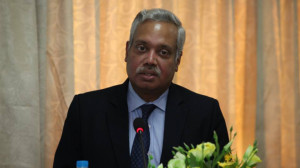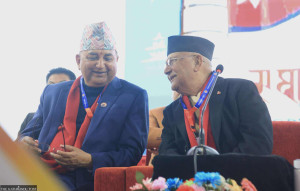National
Nepal feels ripple effect as Brexit triggers shockwaves
The UK on Friday voted for Brexit in EU referendum triggering market shockwaves across Eurozone markets and forcing pound to dive to a 30-year low, the ripple effects that were felt all across the world reached Nepal as well. While rupee saw a plunge against US dollar, gold prices soared.
The UK on Friday voted for Brexit in EU referendum triggering market shockwaves across Eurozone markets and forcing pound to dive to a 30-year low, the ripple effects that were felt all across the world reached Nepal as well. While rupee saw a plunge against US dollar, gold prices soared.
The immediate impact of Brexit was particularly visible on foreign exchange rates that remained volatile throughout the day. With international financial markets fluctuating wildly following the result of the referendum and Indian rupee plunging Rs0.96 against the US dollar, the exchange rate of the Nepali rupee and the greenback surged to Rs109.60 per dollar before stabilising at Rs108.50 in the late afternoon.
The Nepali rupee tumbled mainly due to a devaluation of the Indian rupee with which it is pegged. “A direct impact was seen on foreign exchange rates with Indian currency going down,” said Sashin Joshi, CEO of Nabil Bank. Nepal Rastra Bank (NRB) had fixed the exchange rate at Rs107.96 per dollar for Friday.
Economists and bankers said medium to long-term impacts of Brexit would be felt in Nepal in terms of trade, remittance, aid and tourism.
Since the UK is one of Nepal’s largest bilateral donors, weakening British economy could hit our foreign aid programme, they said. The total foreign assistance to Nepal from the UK amounted to $168.07 million in the fiscal year 2014-15. “How emerging economies like India, China, Russia and Brazil, among others, react to Brexit will determine the impacts that Nepal will face,” said Nar Bahadur Thapa, chief of the research department at NRB. “If their currencies remain weak against the dollar, the impact will also be felt in Nepal.”
Meanwhile, remittance inflows from more than 90,000 Nepalis living in Britain could also be hit if its economy remains fragile following Brexit.
Bankers said if dollar continued to rise, the country’s import bill would surge, driving inflation, which is already in double digits, further.
“As our economy is an import-based economy, a stronger dollar means increased inflationary pressure,” said Joshi.
According to NRB officials, since pound has fallen against dollar, Nepali investments made in British pounds by the central bank, commercial banks and individuals had weakened by around 11 percent.
NRB officials said they were closely monitoring the developments following EU referendum result.
“The volatility in the exchange rate could be a temporary phenomenon though,” said Thapa.
Meanwhile, the domestic bullion market reacted strongly to Britain’s exit from
the EU. Gold prices soared to a two-and-a-half-year high of Rs 59,000 per tola (11.66 gm).
The yellow metal jumped Rs 3,000 on Friday in a reflection of the worldwide financial upheaval after Britain voted to leave the EU.
Gold that was traded at Rs 57,000 per tola on the opening day on Sunday had slipped to Rs 56,000 by Thursday.
Tej Ratna Shakya, former president of the Federation of Nepal Gold and Silver Dealers’ Association, said gold prices in the international market gained on safe-haven buying due to worldwide panic over Britain’s exit from the EU. “As European markets remain uncertain, gold prices have been fluctuating.”
The highest ever price of gold recorded in Nepal is Rs 63,300 per tola which was witnessed on August 28, 2013 after prices jumped Rs 3,400 per tola overnight.




 8.12°C Kathmandu
8.12°C Kathmandu














